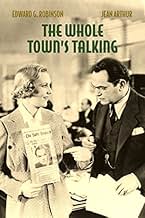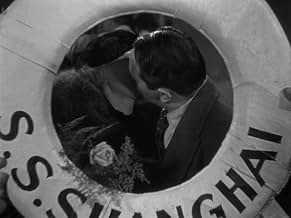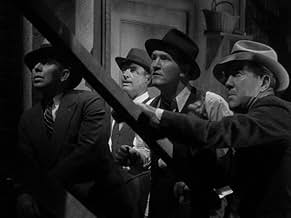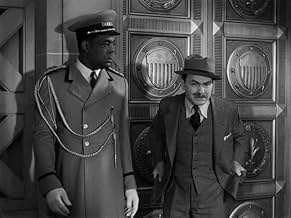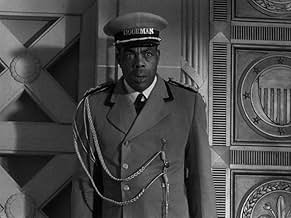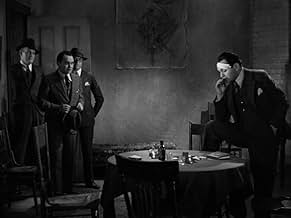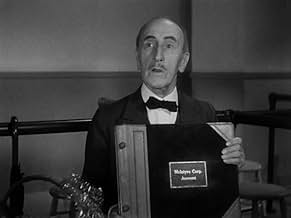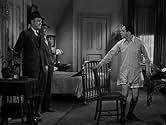NOTE IMDb
7,2/10
3,6 k
MA NOTE
Ajouter une intrigue dans votre langueA meek milquetoast clerk is mistaken for public enemy N° 1, and the notorious killer takes advantage of the situation.A meek milquetoast clerk is mistaken for public enemy N° 1, and the notorious killer takes advantage of the situation.A meek milquetoast clerk is mistaken for public enemy N° 1, and the notorious killer takes advantage of the situation.
- Réalisation
- Scénario
- Casting principal
Harry Abrahams
- Convict
- (non crédité)
Ernie Adams
- Reporter
- (non crédité)
Carmen Andre
- Clerk
- (non crédité)
Chester A. Bachman
- Policeman
- (non crédité)
Eddie Baker
- Policeman
- (non crédité)
Lucille Ball
- Bank Employee
- (non crédité)
H. Barnum
- Undetermined Secondary Role
- (non crédité)
George Barton
- Policeman
- (non crédité)
Avis à la une
Edward G. Robinson stars in "The Whole Town's Talking" along with Jean Arthur, Wallace Ford, and Donald Meek.
Edward G. Robinson was such a wonderful actor, a little guy with a towering talent. Here he has a dual role - that of an escaped criminal, Mad Dog Mannion and that of Arthur Jones, clerical worker, a shy man with a crush on a coworker (Arthur). When Mannion escapes from prison, his face is on the front page, and he looks so much like Jones that someone who sees him in a restaurant turns him into the police. When fingerprint ID verifies that he is not Mannion, he's given a letter by the police chief stating that he's not Mannion and should be left alone and even gets a job writing for the local newspaper about his experiences being mistaken for Mannion.
Unfortunately for poor Arthur, Mannion shows up and wants to use the pass, which he does, raising complete havoc. He also starts giving Arthur info for the news stories - and the police wonder how it is Arthur knows so much.
One of the funniest parts of the film for me was the newspaper description of Mannion - a cruel mouth, a Neandrathal face, etc., and poor Jones looking at himself in the restaurant mirror trying to look evil.
Robinson is fabulous - so sweet, so gentle, such a hard worker as Arthur and a ruthless killer as Mannion. Jean Arthur, as the outspoken Miss Clark is great - when she's questioned by the police, they assume she's Mannion's accomplice, so they keep asking her questions - who did this, who robbed that, and she keeps saying, using a tough, gun moll voice, "MANNION!" Then they find out it's not Mannion they caught after all.
I thought the movie went on just a tad too long, but otherwise, it was quite good, with fun performances, well directed by a man known for his westerns and bigger films, John Ford.
Edward G. Robinson was such a wonderful actor, a little guy with a towering talent. Here he has a dual role - that of an escaped criminal, Mad Dog Mannion and that of Arthur Jones, clerical worker, a shy man with a crush on a coworker (Arthur). When Mannion escapes from prison, his face is on the front page, and he looks so much like Jones that someone who sees him in a restaurant turns him into the police. When fingerprint ID verifies that he is not Mannion, he's given a letter by the police chief stating that he's not Mannion and should be left alone and even gets a job writing for the local newspaper about his experiences being mistaken for Mannion.
Unfortunately for poor Arthur, Mannion shows up and wants to use the pass, which he does, raising complete havoc. He also starts giving Arthur info for the news stories - and the police wonder how it is Arthur knows so much.
One of the funniest parts of the film for me was the newspaper description of Mannion - a cruel mouth, a Neandrathal face, etc., and poor Jones looking at himself in the restaurant mirror trying to look evil.
Robinson is fabulous - so sweet, so gentle, such a hard worker as Arthur and a ruthless killer as Mannion. Jean Arthur, as the outspoken Miss Clark is great - when she's questioned by the police, they assume she's Mannion's accomplice, so they keep asking her questions - who did this, who robbed that, and she keeps saying, using a tough, gun moll voice, "MANNION!" Then they find out it's not Mannion they caught after all.
I thought the movie went on just a tad too long, but otherwise, it was quite good, with fun performances, well directed by a man known for his westerns and bigger films, John Ford.
This is an atypical and impersonal Ford film. Given the studio (Columbia Pictures) and the screenwriter (Robert Riskin), this is an ideal stuff for Frank Capra. But it remains without a doubt one of the most enjoyable and pleasurable comedies ever made. It features graceful dynamism and vibrancy that are rare in the Ford oeuvre. It is also one of his fastest movies. It contains what it is probably one of the finest Edward G. Robinson performances I have seen. He is outstanding in the dual role of a mild, working class office clerk Arthur Ferguson Jones who is mistaken for a ruthless mobster Mannion (the role he perfected in "Little Caesar"). And then there is the lovely Jean Arthur as Robinson's coolly self-reliant co-worker, who starts by pitying him and then encourages him, and ultimately falls in love with him. She and Robinson are superb together. It is nowhere near her splendid presence in Mitchell Leisen's "Easy Living" and Frank Borzage's "History Is Made at Night", but this was the sort of role Arthur was to make of her own.
A must-see!
A must-see!
Whole Town's Talking, The (1935)
*** (out of 4)
A timid, shy and all around weak store clerk (Edward G. Robinson) gets mistaken for a harden gangster (Robinson) but his new fame allows him to store writing a column in a newspaper about how gangster are weak without their guns. Soon the gangster shows up wanting more than just a little help. As a comedy this movie is a real masterpiece but as a drama, the final thirty-minutes or so really bring down a lot of the great moments. While watching this Columbia movie you can't help but wonder if this was originally meant to be directed by Frank Capra as it has his screenwriters and the small town story certainly seems like something you'd get from a Capra and not someone like Ford. To his credit, Ford does a great job with the comedy and really delivers one of the funniest movies of the 1930's. The problem happens in the third act when it really turns to too much of a gangster film and the laughs are pretty much forgotten. What holds both sides together is the terrific performance by Robinson. The way he plays the timid clerk is just downright hilarious and this includes a masterfully acted interrogation sequence where Robinson is nearly brought to tears because he's so scared. Seeing a tough guy like Robinson acting scared was just hilarious and one actually starts to feel sorry for the guy because it appears he's about to die. Robinson is also great in his second role as the gangster as he's as tough as ever and does manage to come off quite demanding and threatening. Jean Arthur is wonderful as well and adds many great comic scenes including her own interrogation where she keeps admitting to crimes that she has nothing to do with or even knows about. Arthur Hohl, Arthur Byron, Wallace Ford and Donald Meek round out the supporting cast. You can even see Joe Sawyer playing one of Robinson's goons. Again, I didn't care for the final act of the film as the comedy starts to not happen but that doesn't take away from everything at the start of the movie. Robinson has never gotten the credit he deserves as an actual actor, which is a real shame but this film allows for both sides of him to be highlighted and to great effect.
*** (out of 4)
A timid, shy and all around weak store clerk (Edward G. Robinson) gets mistaken for a harden gangster (Robinson) but his new fame allows him to store writing a column in a newspaper about how gangster are weak without their guns. Soon the gangster shows up wanting more than just a little help. As a comedy this movie is a real masterpiece but as a drama, the final thirty-minutes or so really bring down a lot of the great moments. While watching this Columbia movie you can't help but wonder if this was originally meant to be directed by Frank Capra as it has his screenwriters and the small town story certainly seems like something you'd get from a Capra and not someone like Ford. To his credit, Ford does a great job with the comedy and really delivers one of the funniest movies of the 1930's. The problem happens in the third act when it really turns to too much of a gangster film and the laughs are pretty much forgotten. What holds both sides together is the terrific performance by Robinson. The way he plays the timid clerk is just downright hilarious and this includes a masterfully acted interrogation sequence where Robinson is nearly brought to tears because he's so scared. Seeing a tough guy like Robinson acting scared was just hilarious and one actually starts to feel sorry for the guy because it appears he's about to die. Robinson is also great in his second role as the gangster as he's as tough as ever and does manage to come off quite demanding and threatening. Jean Arthur is wonderful as well and adds many great comic scenes including her own interrogation where she keeps admitting to crimes that she has nothing to do with or even knows about. Arthur Hohl, Arthur Byron, Wallace Ford and Donald Meek round out the supporting cast. You can even see Joe Sawyer playing one of Robinson's goons. Again, I didn't care for the final act of the film as the comedy starts to not happen but that doesn't take away from everything at the start of the movie. Robinson has never gotten the credit he deserves as an actual actor, which is a real shame but this film allows for both sides of him to be highlighted and to great effect.
Edward G. Robinson acted two roles in this movie and did a great job with both of them. He played the meek clerk and the tough gangster equally well.
This is a comedy, so one expects a happy ending; still, I couldn't tell how the plot was going to turn to make this work out well. Even ten minutes before the end I was still wondering.
This comedy is very well worth seeing for the acting by Robinson, the great character actors, and Jean Arthur in the role that Katz' Film Encyclopedia says was the first to show that she had comedic range. The film is directed by John Ford, and is rather uncharacteristic of the type of film he usually did.
This is a comedy, so one expects a happy ending; still, I couldn't tell how the plot was going to turn to make this work out well. Even ten minutes before the end I was still wondering.
This comedy is very well worth seeing for the acting by Robinson, the great character actors, and Jean Arthur in the role that Katz' Film Encyclopedia says was the first to show that she had comedic range. The film is directed by John Ford, and is rather uncharacteristic of the type of film he usually did.
Enjoyed this 1935 Classic in which Edward G. Robinson plays a duel role as Arthur Ferguson, (Jonesy) and Killer Mannion. Arthur Ferguson is an ordinary law abiding citizen and is rather a very meek person. Unfortunately, Ferguson looks just like a gangster named Killer Mannion who is a harden criminal and they both seem to have the same facial appearance. Jean Arthur, (Wilhelmina Clark) gives a great supporting role along with a great cast of veteran actors. There is a split screen between Arthur Ferguson and Killer Mannion and Edward G. Robinson gives an outstanding performance in 1935 which was not seen very often in films during those days. Killer Mannion tries to murder Ferguson in a bank hold up but things get out of hand. There is plenty of drama and comedy. This is truly a great Classic Film. Enjoy
Le saviez-vous
- AnecdotesThe $250.00 per week that Jones is to get for writing the article in this 1935 comedy translates to $4,999.23 per week in 2019 dollars.
- GaffesWhen Jonesy leaves his apartment in a rush he forgets to turn off the taps and his tub is (torrentially) overflowing. But when he returns from the police much later in the day there is no water anywhere.
- Citations
Arthur Ferguson Jones: You know something, a woman is only a woman, but a good cigar is a smoke.
- ConnexionsEdited into Michael Jackson's This Is It (2009)
Meilleurs choix
Connectez-vous pour évaluer et suivre la liste de favoris afin de recevoir des recommandations personnalisées
- How long is The Whole Town's Talking?Alimenté par Alexa
Détails
- Durée1 heure 33 minutes
- Couleur
- Rapport de forme
- 1.37 : 1
Contribuer à cette page
Suggérer une modification ou ajouter du contenu manquant

Lacune principale
By what name was Toute la ville en parle (1935) officially released in India in English?
Répondre

